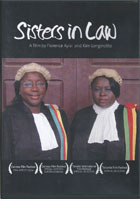
Sisters in Law 2005
Distributed by Women Make Movies, 462 Broadway, New York, NY 10013; 212-925-0606
Produced by Florence Ayisi and Kim Longinotto
Directed by Florence Ayisi and Kim Longinotto
DVD, color, 104 min.
College - Adult
African Studies, Gender Studies, Law, Women's Studies, Multicultural Studies, Domestic Violence
Date Entered: 11/29/2006
Reviewed by Miriam Conteh-Morgan, The Ohio State University Libraries, Columbus, OHThe dominant narrative about African women tends to focus on their submissiveness and lack of agency in oppressive patriarchal systems. It is, therefore, refreshing to see them portrayed as powerful, confident and in control of their own destinies in this documentary about women lawyers who use the justice system in Kumba, Cameroon to promote the rights of women and children, and regular wives and mothers making decisions about their lives.
The documentary follows five cases involving child custody, child abuse, and spousal abuse. In the first, prosecutor Vera Ngassa meets with a fast-talking, young woman requesting custody of her child, her father who allowed the child to be taken away, and the father of the child. The men claim the latter and the woman were married according to traditional ethnic rites, but that instantly sets off a sharp retort from the prosecutor about the legality of such marriages. While the woman is granted custody of the child and subsequently withdraws the case, viewers begin to get an insight into the complex nature of seemingly parallel legal systems and customary practices. These other legal systems and practices, mainly informed by Islamic rules or ethnic/regional norms, regulate certain aspects of life, and sometimes collide with the national legal system, which itself reflects the complex historical legacy of modern Cameroon. The former colony was divided into French- and English-controlled sections, and so the modern federal state combines elements of French, British and customary laws.
A good example of such a collision is seen in the spousal abuse cases where two Muslim women seek recourse through the national legal system. The husbands believe Islamic tradition allows them to be abusive and control their wives’ movement in and outside the home. What they are not aware of is that this violates the women’s rights, as defined by national laws, and brings them up against formidable women in the justice department, namely the straight-shooting prosecutor Ngassa, legal aide Veraline who doubles as the wives’ encourager-in-chief, and the stern judge Beatrice Ntuba who eventually convicts the husbands on abuse charges. However, it is the customary court where the marriage is registered that has authority to grant the divorce.
The victory in these cases, ground-breaking in Cameroon, is overshadowed by the two child abuse cases. Nine year-old Sonita is raped by a neighbor, an illegal immigrant from Nigeria. His evocation of Christian values fails to sway the judge and he is sentenced to nine years in prison and subsequent deportation. The other case involves the physical abuse of a six year-old girl who is brought to the prosecutor’s office by a neighbor. Her body bears the scars of brutal beatings, for which her guardian receives four years jail time. Woven in this case is an aspect of African child-rearing practices – glossed over by the filmmakers--wherein a relative can assume the role of guardian of a child in less fortunate circumstances without any legal paperwork. Many guardians, like the one portrayed here, typically violate the trust on which such agreements are based and physically abuse the children. This harsh treatment stands in sharp contrast to the loving relationship shown between Ms. Ngassa and her little son, and perhaps explains why her interest in the case goes beyond that of prosecutor. She asks to be kept informed about the child’s progress, and strangely, visits the convicted guardian in prison and offers to buy her cough medication. As she points out, the sentence should be seen as a deterrent rather than punishment.
Ayisi and Longinotto piece together a narrative that celebrates positive steps towards enforcing women’s and children’s legal rights in Africa. The telling of the story, albeit jerky, is well captured in the translation from pidgin to English as rendered in the subtitles. One major shortcoming of the documentary is that it fails to provide much contextual background. For example, there is little or no information about Cameroon, nor do we know if the enforcement successes in Kumba are being replicated elsewhere in the country. Also, the second judge who sits on one of the spousal abuse cases simply breezes in and out of court and film, nameless. It would have been helpful, too, to learn more about Hausa Quarters. Given that no men are shown there, does it mean the other women living there are also divorcees who have formed a support community of their own? If so, are there such others in Cameroon? These notwithstanding, the strength of this documentary, like Sembene Ousmane’s films Faat Kine and Moolade, lies in its depiction of African women charting a more liberating course. More such films showing African women as multi-faceted are needed.
Highly recommended.
Awards
- Cannes Film Festival C.I.C.A.E Award, 2005
- Amsterdam International Documentary Film Festival Audience Award, 2005
- Nominated Best British Documentary, British Independent Film Awards, 2005